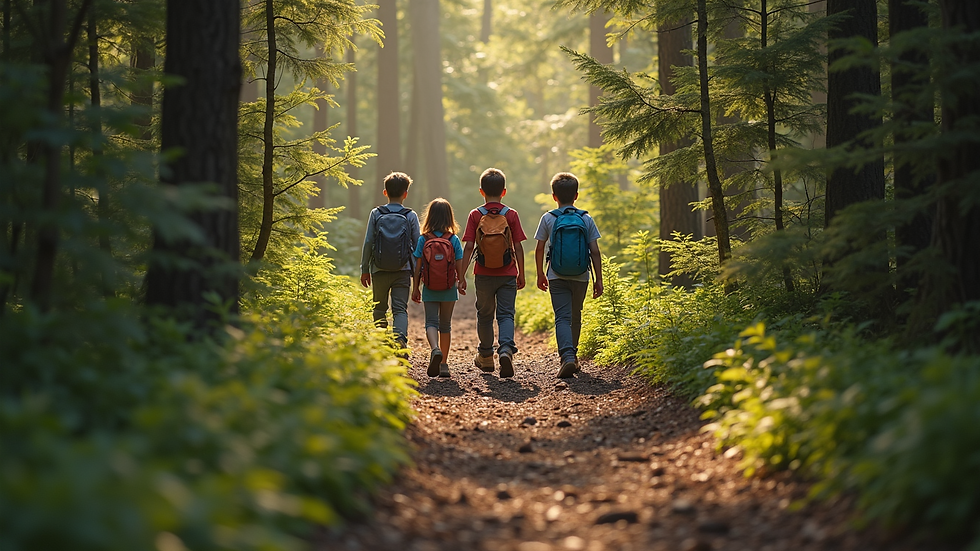What to Expect from a Summer Camp Program for Kids
- alphataekwondo01
- Oct 13
- 4 min read
Summer camps offer a unique opportunity for children to explore new interests, develop social skills, and enjoy the outdoors. Parents often wonder what exactly their kids will experience during these programs. Understanding what to expect can help families prepare and make the most of the summer camp season. This article breaks down the key aspects of summer camp activities, the benefits, and practical tips for parents.
Exploring the Variety of Summer Camp Activities
Summer camp activities are designed to be fun, educational, and engaging. They often include a mix of physical, creative, and social experiences that help children grow in different ways. Here are some common types of activities you can expect:
Outdoor Adventures: Hiking, swimming, canoeing, and nature walks encourage physical fitness and a love for the environment.
Sports and Games: Team sports like soccer, basketball, and relay races promote teamwork and healthy competition.
Arts and Crafts: Painting, pottery, and DIY projects foster creativity and fine motor skills.
Performing Arts: Drama, music, and dance sessions help build confidence and self-expression.
STEM Activities: Science experiments, robotics, and coding workshops introduce kids to technology and problem-solving.
These activities are usually structured to balance fun and learning, ensuring children stay engaged throughout the day. Camp counselors guide the kids, providing support and encouragement.

Benefits of Participating in a Summer Camp Program
Enrolling your child in a summer camp program can have lasting positive effects. Beyond just keeping kids busy during the summer, camps offer several developmental benefits:
Social Skills Development: Kids learn to make new friends, share, and cooperate with others.
Independence: Being away from home helps children build confidence and self-reliance.
Physical Health: Active play and outdoor time improve fitness and overall well-being.
Emotional Growth: Facing new challenges and trying new things helps children develop resilience.
Skill Building: Camps often teach specific skills, from sports techniques to artistic talents.
Parents often notice improvements in their child’s communication and problem-solving abilities after attending camp. The supportive environment encourages kids to step out of their comfort zones safely.

What is the Best Age to Start Summer Camp?
Choosing the right age to start summer camp depends on the child’s personality, maturity, and previous experiences. Generally, many camps accept children as young as 5 or 6 years old. Here are some considerations:
Younger Children (Ages 5-7): Camps for this age group often focus on shorter days and more supervised activities. They emphasize fun and socialization with gentle guidance.
Middle Childhood (Ages 8-12): Kids in this range can handle longer days and more structured activities. They benefit from a mix of independence and teamwork.
Teens (Ages 13+): Older campers often have opportunities for leadership roles, specialized skill development, and more challenging adventures.
If your child is new to camp, starting with a day camp or a shorter session can help ease the transition. Observing how your child adapts to the camp environment will guide future decisions.

How to Prepare Your Child for Summer Camp
Preparation is key to ensuring your child has a positive camp experience. Here are some practical tips to get ready:
Discuss Expectations: Talk about what camp will be like, including daily routines and activities.
Practice Independence: Encourage your child to manage simple tasks like dressing, eating, and packing.
Label Belongings: Clearly mark all clothing and gear to avoid lost items.
Pack Smart: Include weather-appropriate clothing, sunscreen, water bottles, and any necessary medications.
Stay Positive: Share excitement about the new experiences and friendships your child will make.
Parents can also connect with camp staff ahead of time to address any concerns or special needs. This communication helps create a supportive environment for the child.
Tips for Choosing the Right Summer Camp
Selecting the right camp is crucial for a successful experience. Consider these factors when making your choice:
Camp Philosophy: Look for a camp whose values align with your family’s priorities, whether it’s sports, arts, academics, or general fun.
Safety Measures: Ensure the camp has proper staff training, emergency protocols, and a good counselor-to-camper ratio.
Location and Facilities: Proximity to home and quality of facilities can impact convenience and comfort.
Camp Size: Some children thrive in smaller, intimate settings, while others enjoy larger groups.
Reviews and Recommendations: Talk to other parents and read reviews to get a sense of the camp’s reputation.
Visiting the camp beforehand, if possible, can provide valuable insight and reassurance.
Encouraging Lifelong Skills Through Summer Camp
Summer camp activities do more than fill the summer days - they help children develop skills that last a lifetime. These include:
Leadership: Taking on roles in group projects or team sports builds leadership qualities.
Problem Solving: Facing new challenges encourages creative thinking and adaptability.
Communication: Interacting with peers and counselors improves verbal and non-verbal communication.
Time Management: Following schedules and balancing activities teaches responsibility.
Cultural Awareness: Camps with diverse participants expose children to different backgrounds and perspectives.
Parents can reinforce these skills by discussing camp experiences and encouraging reflection after each day.
Making the Most of Your Child’s Summer Camp Experience
To maximize the benefits of summer camp, consider these actionable recommendations:
Stay Involved: Attend camp events or volunteer if possible to show support.
Encourage Journaling: Suggest your child keep a camp journal to document memories and lessons.
Promote Friendships: Help your child stay connected with camp friends after the program ends.
Celebrate Achievements: Recognize new skills and milestones reached during camp.
Plan for Next Year: Use feedback from your child to choose future camps that match their evolving interests.
By actively engaging with your child’s camp journey, you help deepen the positive impact of the experience.
Summer camp activities provide a rich environment for growth, fun, and learning. With the right preparation and expectations, your child can enjoy a memorable and rewarding summer.



Comments